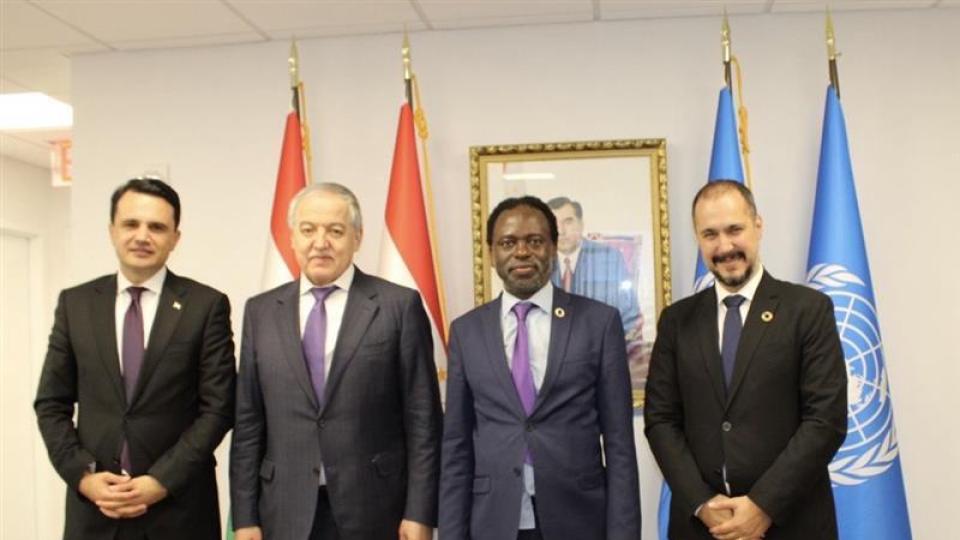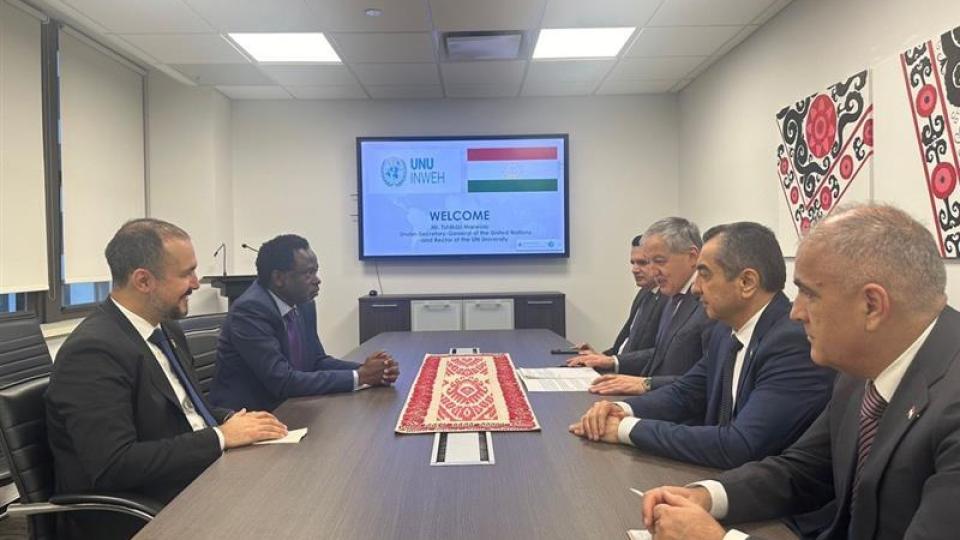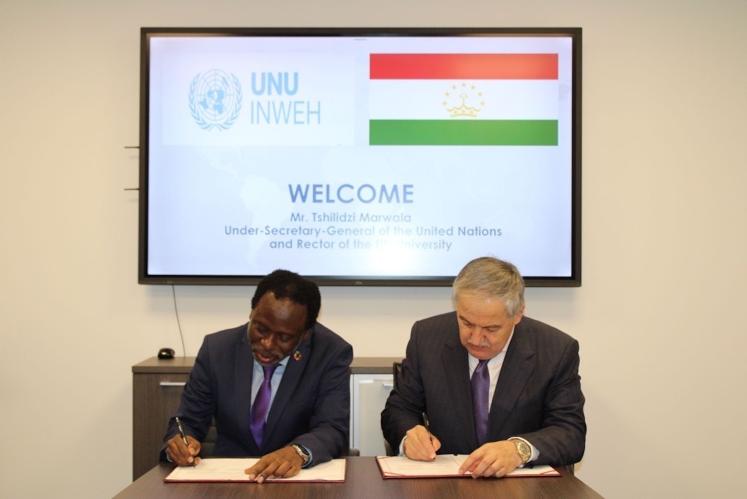New York, September 22, 2024 – On the sidelines of the Summit of the Future in New York, the United Nations University (UNU) and the Republic of Tajikistan formalized a landmark partnership agreement. This agreement aims to enhance academic and scientific collaboration between UNU, acting through its Institute for Water, Environment and Health (UNU-INWEH), and Tajikistan, acting through its Ministry of Foreign Affairs.
The partnership seeks to address critical global environmental challenges, with a particular focus on issues related to water, environment, health, food security, agriculture, climate change, biodiversity, and sustainability transitions. The collaboration will promote the sharing of knowledge, capacity-building initiatives, and policy-relevant research to support the efforts of the Republic of Tajikistan and the United Nations at national, regional, and global levels. It will also strengthen science, technology, innovation, and sustainable development initiatives, in line with the 2030 Agenda for Sustainable Development.
In a signing ceremony held at the Permanent Mission of the Republic of Tajikistan to the UN in New York, the Under-Secretary-General of the United Nations and Rector of the United Nations University, Tshilidzi Marwala, and the Minister of Foreign Affairs of the Republic of Tajikistan, signed this agreement, reflecting their commitment to advancing scientific approaches in tackling pressing environmental issues.
"Today marks a new chapter in our enduring partnership of over ten years with UNU and UNU-INWEH. This collaboration reflects our shared commitment to addressing the global challenges of water availability and environmental protection. Tajikistan takes pride in being a global advocate for water. Addressing the global water challenges will benefit from scientific knowledge-sharing. UNU is the right partner for bridging the science-policy gap and strengthening the technical capacity the world requires to address its problems. We are proud of the progress we have made together with UNU-INWEH and look forward to expanding our joint efforts to ensure a more sustainable and resilient future for all", said Minister Sirojiddin Muhriddin.
Through this partnership, the two organizations will collaborate on joint research projects, capacity-building activities, knowledge exchange, and policy advice that benefit Tajikistan and other UN member states. These initiatives will be implemented in collaboration with academic institutes and universities in Tajikistan, focusing on climate change, water, environment, food, agriculture, biodiversity, sustainability, and health.
“This partnership will strengthen coordination between Tajikistan and UNU and enhance cooperation on programs that promote knowledge sharing, capacity building, and policy-relevant research, contributing to both parties’ work on global sustainability challenges, particularly in science, technology, innovation, and sustainable development,” said Rector Tshilidzi Marwala.
Tajikistan has a proven commitment to addressing the global water challenges. This UN member state had played a major role in developing 10 UN General Assembly resolutions and shaping global initiatives such as the International Year of Freshwater, the Year of Water Cooperation, the "Water for Life" and "Water for Sustainable Development" decades, and the International Year of Glaciers’ Preservation. It also served as the co-host of the UN Water Conference in 2023, playing a key role in advocacy for the water agenda and resuming high-level global conversations about freshwater after nearly 50 years.
As a key advocate for global water issues, Tajikistan has a long history of collaboration on various water initiatives with UNU-INWEH, commonly referred to as "the Water Think Tank of the United Nations". The UNU-Tajikistan agreement marks a significant step toward achieving shared goals of the and enhancing the impact and effectiveness of the two parties in their work.
“We are thrilled to embark on this significant partnership with the Ministry of Foreign Affairs of the Republic of Tajikistan. This collaboration aligns perfectly with our mission to address pressing global challenges related to water, environment, and health. By combining our expertise and resources, we aim to make substantial contributions to sustainable development and the 2030 Agenda. Together, we will advance scientific research, enhance capacity-building efforts, and promote knowledge exchange to tackle the critical issues facing our world today,” said Kaveh Madani, the Director of UNU-INWEH and a globally recognized water scientist, who will be leading this partnership between UNU and Tajikistan.


About the United Nations University
As the academic arm of the United Nations with 13 institutes in 12 countries around the world, the United Nations University addresses a range of global development challenges through joint research and education with its Headquarters based in Tokyo, Japan. The partnership will enable active partnership between Tajikistan and UNU Institute for Water, Environment and Health (UNU-INWEH), based in Richmond Hill, Ontario, Canada. The UNU-INWEH is working on major sustainability issues, dealing with the most pressing water, environmental, and health problems around the world.
Media Contact
Kyra Bowman
Head of Communications, UNU
bowman@unu.edu






